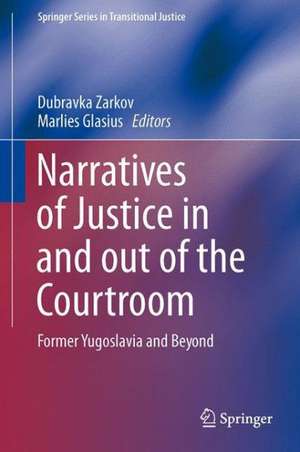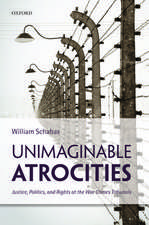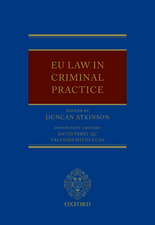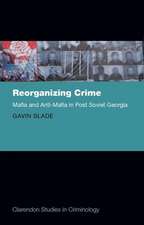Narratives of Justice In and Out of the Courtroom: Former Yugoslavia and Beyond: Springer Series in Transitional Justice, cartea 8
Editat de Dubravka Zarkov, Marlies Glasiusen Limba Engleză Hardback – 24 mar 2014
Moreover, the volume situates narratives of transitional justice in former Yugoslavia both within specific national spaces - such as Serbia, and Bosnia - and beyond the Yugoslav. In this way it also considers experiences from other countries and other times (post-World War II) to offer a sounding board for re-thinking the meanings of transitional justice and institutions within former Yugoslavia. Included in the volume's coverage is a look at the Rwandan tribunals, the trials of Charles Taylor, Radovan Karadzic, the Srebrenica genocide, and other war crimes and criminals in the Yugoslav. Finally, it frames all of those narratives and experiences within the global dynamics of legal, social and geo-political transformations, making it an excellent resource for social science researchers, human rights activists, those interested in the former Yugoslavia and international relations, and legal scholars.
| Toate formatele și edițiile | Preț | Express |
|---|---|---|
| Paperback (1) | 636.12 lei 6-8 săpt. | |
| Springer International Publishing – 3 sep 2016 | 636.12 lei 6-8 săpt. | |
| Hardback (1) | 640.88 lei 6-8 săpt. | |
| Springer International Publishing – 24 mar 2014 | 640.88 lei 6-8 săpt. |
Preț: 640.88 lei
Preț vechi: 753.97 lei
-15% Nou
Puncte Express: 961
Preț estimativ în valută:
122.64€ • 127.32$ • 102.27£
122.64€ • 127.32$ • 102.27£
Carte tipărită la comandă
Livrare economică 24 martie-07 aprilie
Preluare comenzi: 021 569.72.76
Specificații
ISBN-13: 9783319040561
ISBN-10: 3319040561
Pagini: 204
Ilustrații: XVII, 188 p. 6 illus. in color.
Dimensiuni: 155 x 235 x 17 mm
Greutate: 0.43 kg
Ediția:2014
Editura: Springer International Publishing
Colecția Springer
Seria Springer Series in Transitional Justice
Locul publicării:Cham, Switzerland
ISBN-10: 3319040561
Pagini: 204
Ilustrații: XVII, 188 p. 6 illus. in color.
Dimensiuni: 155 x 235 x 17 mm
Greutate: 0.43 kg
Ediția:2014
Editura: Springer International Publishing
Colecția Springer
Seria Springer Series in Transitional Justice
Locul publicării:Cham, Switzerland
Public țintă
ResearchCuprins
Introduction.- Part One. Narratives of Law and Justice in the International Courtrooms.- Chapter 1 ‘Locals’ and ‘Internationals’ in Discourses and Practices of International Justice.- Chapter 2 Expert Witnesses and the International War Crimes Trials. Making Sense of Large-Scale Violence in Rwanda.- Chapter 3 Terror, Terrorizing, Terrorism. Instilling Fear as a Crime in the Cases of Radovan Karadzic and Charles Taylor.- Chapter 4
The Shifting Status of Grand Narratives in War Crimes Trials and International Law. History and Politics in the Courtroom.- Part Two: Dealing with Justice after Yugoslav Wars.- Chapter 5 A Crack in the Wall of Denial. The Scorpions Video in and out of the Serbian Courtrooms.- Chapter 6 Tracing Dialogue on the Legacy of War Crimes in Serbia.- Chapter 7 ‘Forever Connected’. State Narratives and the Dutch Memory of Srebrenica.- Chapter 8 Resisting the Culture of Trauma in Bosnia and Herzegovina. Emancipatory Lessons for/in Cultural and Knowledge Production.- Chapter 9
War Reparations in Bosnia and Herzegovina. Individual Stories and Collective Interests.
War Reparations in Bosnia and Herzegovina. Individual Stories and Collective Interests.
Notă biografică
Dubravka Zarkov is an associate professor of Gender, Conflict and Development at the International Institute of Social Studies/EUR, The Hague. She teaches on feminist epistemology, conflict theories and media representations of war and violence. Her main fields of interest are gender, sexuality and ethnicity in the context of war and violence, and their media representations. In 2012 Zarkov was a recipient of NIAS fellowship. She published The Body of War: Media, Ethnicity and Gender in the Break-up of Yugoslavia (2007, Duke University Press) about media representations of war in former Yugoslavia, and Gender, Conflict, Development (2008, Zubaan) about global dimensions of contemporary wars. In 2002 Zarkov co-edited with Cynthia Cockburn a book about Dutch peacekeeping in Bosnia, The Postwar Moment: Militaries, Masculinities and International Peacekeeping (Lawrence and Wishart).
Marlies Glasius is a Professor in International Relations at the Department of Politics, University of Amsterdam and holder of the Special Chair, Citizen Involvement in Conflict and Post-Conflict Zones, Free University Amsterdam. She was previously the managing editor of the Global Civil Society Yearbook, coordinator of the Study Group on European Security, and a lecturer in Global Politics at the London School of Economics and Political Science (LSE). She published research on international criminal courts, including The International Criminal Court: A Global Civil Society Achievement (2006) and a number of journal articles and book chapters on the relations between international criminal courts and their socio-political contexts. In 2012 Glasius was a recipient of NIAS fellowship
Marlies Glasius is a Professor in International Relations at the Department of Politics, University of Amsterdam and holder of the Special Chair, Citizen Involvement in Conflict and Post-Conflict Zones, Free University Amsterdam. She was previously the managing editor of the Global Civil Society Yearbook, coordinator of the Study Group on European Security, and a lecturer in Global Politics at the London School of Economics and Political Science (LSE). She published research on international criminal courts, including The International Criminal Court: A Global Civil Society Achievement (2006) and a number of journal articles and book chapters on the relations between international criminal courts and their socio-political contexts. In 2012 Glasius was a recipient of NIAS fellowship
Textul de pe ultima copertă
This volume considers the dynamic relations between the contemporary practices of international criminal tribunals and the ways in which competing histories and discourses of war, violence and justice are re-imagined and re-constructed in the former Yugoslavia and beyond. There are three innovative aspects of the book. The first is the focus on narratives of justice and their production, the second is its comparative perspective, and the third is its multidisciplinary angle.
While legal scholars have tended to analyze transitional justice and the international criminal tribunals in terms of their success or failure in establishing the facts of war crimes, this volume goes beyond a ‘score-card’ approach. It investigates how the courts create a symbolic space within which competing narratives of crimes, perpetrators and victims are produced, circulated and contested. It analyzes how international criminal law and the courts gather, and in turn produce, knowledge about societies in war, their histories and identities, and their relation to the wider world.
It then proceeds to analyze how this knowledge corresponds to the discourses and practices within these societies. The volume situates narratives of transitional justice both within specific national spaces - such as Serbia, Bosnia and the Netherlands - and beyond them, in the international context of the practices of transitional justice institutions. In this way, this collection considers experiences from other times (the Nuremberg Tribunal) and other countries (Rwanda, Sierra Leone and Liberia) to offer a sounding board for re-thinking the meanings of transitional justice and its institutions within former Yugoslavia.
Finally, the book frames all of those narratives and experiences withinthe global dynamics of mediated communication, where media practices are as important as practices of law, and where personal testimonies, expert knowledge, and visual images compete in establishing, and contesting, not just the facts of the crimes but also the meanings of those facts.
These original aspects of this book make it an excellent resource for researchers in law, social science and humanities, for those interested in the former Yugoslavia, and for human rights activists and transitional justice practitioners.
While legal scholars have tended to analyze transitional justice and the international criminal tribunals in terms of their success or failure in establishing the facts of war crimes, this volume goes beyond a ‘score-card’ approach. It investigates how the courts create a symbolic space within which competing narratives of crimes, perpetrators and victims are produced, circulated and contested. It analyzes how international criminal law and the courts gather, and in turn produce, knowledge about societies in war, their histories and identities, and their relation to the wider world.
It then proceeds to analyze how this knowledge corresponds to the discourses and practices within these societies. The volume situates narratives of transitional justice both within specific national spaces - such as Serbia, Bosnia and the Netherlands - and beyond them, in the international context of the practices of transitional justice institutions. In this way, this collection considers experiences from other times (the Nuremberg Tribunal) and other countries (Rwanda, Sierra Leone and Liberia) to offer a sounding board for re-thinking the meanings of transitional justice and its institutions within former Yugoslavia.
Finally, the book frames all of those narratives and experiences withinthe global dynamics of mediated communication, where media practices are as important as practices of law, and where personal testimonies, expert knowledge, and visual images compete in establishing, and contesting, not just the facts of the crimes but also the meanings of those facts.
These original aspects of this book make it an excellent resource for researchers in law, social science and humanities, for those interested in the former Yugoslavia, and for human rights activists and transitional justice practitioners.
Caracteristici
Focuses on international criminal tribunals and how narratives of justice are constructed Provides insights into the activities within the actual courtrooms, including witness testimony, as well as the broader social and political debates Offers perspectives on the Rwanda tribunal, the Radovan Karadzic trial, the Charles Taylor trial, and how they relate to the experiences of the former Yugoslavia Includes supplementary material: sn.pub/extras



















